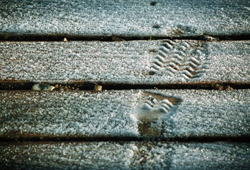PERCEPTUAL CONSCIOUSNESS AND COGNITIVE ACCESS
In the weekend 18-19 February 2017 CNRU is hosting an international workshop on Perceptual Consciousness and Cognitive Access. Top researchers within the field of consciousness research - among these Professor of Philosophy and Psychology at New York University, Ned Block - are visiting Aarhus and will give talks at the workshop.

DATE: 18-19 February 2017, both days from 9.00 to 18.15
VENUE:
Aarhus Institute of Advanced Studies (AIAS)
Høegh-Guldbergs Gade 6B
8000 Aarhus C, Denmark
Building 1632 - 114
The problem of consciousness is often regarded as one of the top ten unsolved problems in science. A crucial aspect of this problem is to find the neural underpinnings of consciousness, i.e. the locus of the neural activity that correlates with having conscious experiences. An important question in this regard is whether the neural machinery underlying perceptual consciousness is independent of the neural machinery underlying cognitive access.
The two most influential positions theorists propose are on the opposite ends of the spectrum. On the one hand, a family of theories build cognitive access mechanisms (availability for working memory) right into the definition of consciousness, whereas, on the other hand, it is argued that while the content of perceptual consciousness is rich, working memory is of limited capacity, and therefore perceptual consciousness overflows cognitive access: one is conscious of much more than what one can report.
The ongoing debate between these two positions inspires really insightful and innovative empirical investigations. In recent years a variety of novel studies have been published that try to settle the debate in one way or another: either by demonstrating that conscious experiences are, indeed, richer than what can be reported, or by showing that the alleged richness of consciousness is overestimated, i.e. that non-reportable information is only present in conscious experiences in a generic form.
By bringing together the leaders of the labs conducting these experiments and the most influential theorists working on how the empirical results might best be interpreted, the conference tries to advance the debate over the relationship between consciousness and brain processes in general and phenomenal consciousness and cognitive access in particular.
Invited speakers:
- Ned Block (NYU)
- Michael Cohen (MIT)
- Jean-Rémi King (NYU / FIAS)
- Victor Lamme (Amsterdam)
- Ian Phillips (Oxford)
- Marius Usher (Tel Aviv)
- Emily Ward (Donders Institute)
All are welcome!
Attendance is free, but, please, register by sending an email to:
phenomenal.overflow@gmail.com
PROGRAM

SATURDAY 18 February 2017
09:00 - 10:30 Victor Lamme: The three reasons why consciousness is not cognition
10:30 - 10:00 coffee
11:00 - 12:30 Marius Usher: Impoverished or Rich Consciousness outside Attentional Focus: from summary statistics to transient awareness of visual primitives
12:30 - 14:00 lunch
14:00 - 15:15 Emily Ward: Visual awareness: Dissociating the mind and the world
15:15 - 15:30 coffee
15:30 - 16:45 Peter Fazekas: Quality of representations, perceptual experience, and cognitive access – A no-overflow proposal
16:45 - 17:00 coffee
17:00 - 18:30 Ned Block: A joint in nature between perception and cognition without modularity of perception
SUNDAY 19 February 2017
09:00 - 10:30 Ian Phillips: Identify Yourself: Phenomenal Overflow and Marr’s Paradox
10:30 - 10:00 coffee
11:00 - 12:30 Jean-Rémi King: Decoding the neural architecture of conscious and unconscious perception
12:30 - 14:00 lunch
14:00 - 15:15 Michael Cohen: Can ensembles and summary statistics capture the richness of consciousness?
15:15 - 15:30 coffee
15:30 - 16:45 Morten Overgaard: The empirical dissociation of subjective experience and cognitive access
16:45 - 17:00 coffee
17:00 - 18:15 Roundtable discussion
Organisers:
- Peter Fazekas (Philosophy & CNRU, Aarhus; Centre for Philosophical Psychology, Antwerp)
- Morten Overgaard (CNRU, Aarhus)
The Workshop is funded by the Carlsberg Foundation and the DFF-Mobilex Grant 1321-00165.
